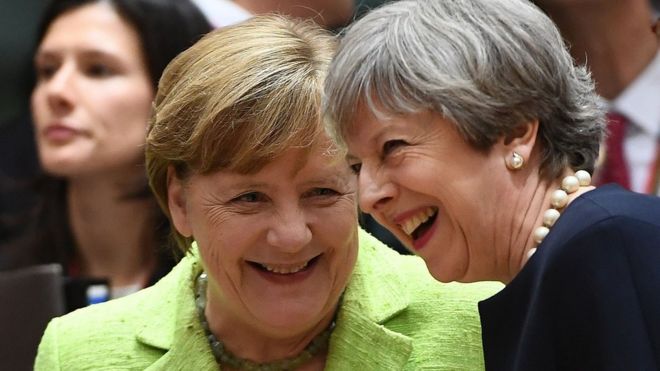
Brexit: UK offer on EU citizens a good start, says Merkel
German Chancellor Angela Merkel has described UK plans to ensure the rights of EU citizens in Britain after Brexit as "a good start".
However, she said there were "many, many other questions" about Brexit and there was "still a lot to do".
The UK proposal was unveiled by Prime Minister Theresa May at an EU summit in Brussels on Thursday.
It would grant EU migrants who had lived in the UK for five years a new "UK settled status".
That would allow them to stay in the country and access health, education and other benefits.
The plan would affect 3.2 million EU citizens now living in the UK.
Their rights - and the rights of UK citizens living in the rest of the EU - are among the thorny issues that have to be resolved early on in Brexit talks, along with the UK's divorce bill and the Northern Ireland border.
"Theresa May made clear today that EU citizens who have been in Great Britain for five years can keep their full rights. That's a good start," said Mrs Merkel at the end of Thursday's talks.
"But of course there are many, many other questions about Brexit - about finances, about the relationship with Ireland - which means we still have a lot to do until October."
She insisted that Brexit was not the focus of the summit - the UK's split from the EU is being negotiated separately.
"For me the shaping of the future of the 27 is a priority coming before the issue of the negotiations with Britain on the exit," she added.
Before Mrs May's offer, the EU proposed that EU citizens in the UK and the estimated 1.2 million Britons living in EU countries should continue enjoying the same rights, enforceable by the European Court of Justice (ECJ).
At the summit, the PM sought to reassure the 27 other EU states, saying the UK "does not want anyone here to have to leave, nor does it want families to be split up".
"No-one will face a cliff edge," she said.
The UK stunned the EU when it voted to end its membership in a referendum a year ago on Friday. The exit deadline is 30 March 2019.
The summit's final day is to focus on migration, security and economic issues.
Counter-terrorism has been a key issue at the summit which comes in the wake of an attack in Brussels on Tuesday.
Several EU states have been attacked in recent weeks, including the UK, France and Sweden, and Mrs May said that an attack against any member state was an attack on all.
Questions remain: Chris Morris, BBC News, Brussels
Both sides would like to get the issue of citizens' rights wrapped up as soon as possible - it would be good for morale to get an early win, and they have more difficult issues to tackle.
But while there is a sense that progress can be made, there are still some tricky technical questions to deal with.
Which rights will be extended to immediate family members living elsewhere - to children in particular? And who will guarantee citizens' rights in the event of any legal dispute? The EU has already insisted that the European Court of Justice should be involved; the UK insists that British courts should uphold the deal.
It is also not clear what the cut-off date should be for citizens to qualify for any offer that is agreed. The UK proposal suggests a date between March 2017 and March 2019 - although it is highly unlikely that the EU would be willing to accept a date that has already passed.
From an EU perspective, what we've heard so far from the UK side remains rather vague. EU negotiators will want to see the details of this proposal which are only due to be made public next Monday.
Credit: The BBC

